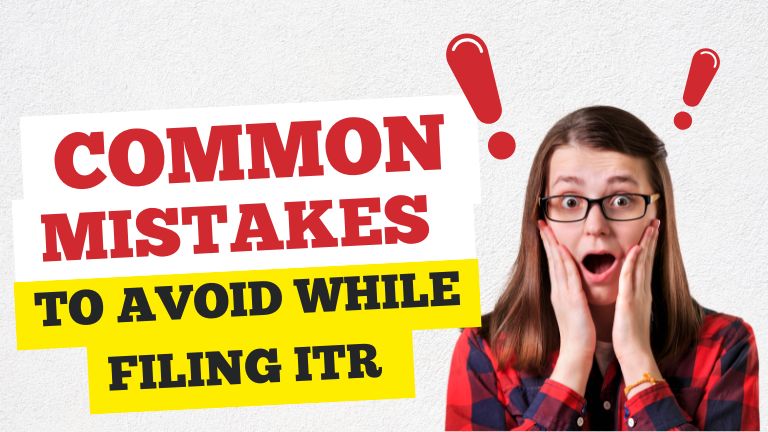
Filing your Income Tax Return (ITR) is an important financial duty for every taxpayer in India. Not only is it a legal obligation, but getting your ITR right can also unlock various benefits, like smoother loan approvals, easier visa applications, and the ability to carry forward losses. Unfortunately, many taxpayers make common mistakes during this process, which can lead to notices from the Income Tax Department, penalties, or even scrutiny. To ensure a hassle-free filing experience, it’s crucial to understand and steer clear of these pitfalls.
Here’s a handy guide to the common mistakes you should avoid while filing your ITR:
1. Not Filing ITR on Time
One of the most common and easily avoidable blunders is missing the Online ITR filing deadline. For most individual taxpayers, this deadline falls on July 31st of the assessment year. Filing late can lead to:
-
A late fee under Section 234F (up to ₹5,000),
-
Interest on tax due under Section 234A,
-
Ineligibility to carry forward certain losses (like capital gains or business loss).
Tip: Make sure to mark your calendar or set reminders, and aim to file well ahead of the deadline to dodge any last-minute stress.
2. Choosing the Wrong ITR Form
Picking the right ITR form based on your income source is essential. Each form is designed for a specific category:
-
ITR-1 (Sahaj): Salaried individuals with income up to ₹50 lakh.
-
ITR-2: Individuals with capital gains, more than one house property, or foreign assets.
-
ITR-3: Individuals running a business or profession.
-
ITR-4 (Sugam): Presumptive income scheme under Sections 44AD, 44ADA, or 44AE.
Using the wrong form may lead to return rejection or non-processing.
3. Mismatch of Income Details with Form 26AS/Annual Information Statement (AIS)
Many taxpayers overlook the importance of matching their TDS (Tax Deducted at Source) details with their Form 26AS or AIS. If the income you report in your ITR doesn’t align with these statements, your return might be flagged or deemed defective.
Tip: Always cross-check your salary, interest income, dividends, or any other source of income with Form 26AS and AIS before filing.
4. Not Reporting All Sources of Income
Even if your secondary income seems negligible, non-disclosure can result in penalties. Some commonly forgotten income sources include:
-
Interest from savings or fixed deposits
-
Freelance or consulting income
-
Gifts received exceeding ₹50,000
-
Capital gains from shares or mutual funds
-
Rental income from additional properties
Tip: Make a checklist of all income sources and ensure nothing is left out.
5. Incorrect Claim of Deductions or Exemptions
While deductions like Section 80C, 80D, or HRA help reduce your taxable income, incorrectly claiming them can backfire. For instance:
-
Claiming deductions without valid proof (like investment receipts).
-
Claiming deduction for interest on home loan under wrong sections.
-
Declaring HRA exemption while living in own property.
Tip: Ensure that all claims are backed by valid documents and fall under the applicable limits.
6. Forgetting to Verify the ITR
Filing the return is only the first step. The second and equally important step is verification. You must e-verify your ITR within 30 days of filing, else it will be treated as null and void.
Verification can be done via:
-
Aadhaar OTP,
-
Net banking,
-
Demat account,
-
Sending a signed ITR-V to CPC Bangalore.
Tip: Choose a convenient method and complete the verification as soon as you file the return.
7. Ignoring Advance Tax or Self-Assessment Tax
If your tax liability exceeds ₹10,000 in a financial year (after TDS), you’re liable to pay advance tax. Many taxpayers, especially freelancers and professionals, ignore this rule.
Failure to pay advance tax attracts interest under Sections 234B and 234C.
Tip: Use tax calculators or consult a tax expert to estimate your advance tax and pay it in time.
8. Using Incorrect Bank Account Details
Any refund from the IT Department is directly credited to your bank account. Providing incorrect or inactive account details can delay or even cause refund failures.
Tip: Ensure that the bank account is active, in your name, and pre-validated on the income tax e-filing portal.
9. Not Disclosing Foreign Assets or Income
Resident taxpayers must disclose foreign bank accounts, assets, and income in their ITR. Failing to do so may attract strict penalties under the Black Money Act.
Tip: Be transparent and disclose all foreign income and assets in the appropriate schedule of your return.
10. Relying Solely on Form 16
Form 16 is an essential document for salaried individuals, but it may not capture all your income. For example, income from other sources like rent, FD interest, or capital gains will not be reflected in Form 16.
Tip: Use Form 16 as a base, but always review Form 26AS, AIS, and your bank statements for a complete picture.
Conclusion
Filing your Income Tax Return with care ensures compliance, helps you avoid unnecessary penalties, and keeps your financial records clean. While the process has become more streamlined with the e-filing portal, it still requires vigilance, accuracy, and timely action.
To sum up:
-
File before the deadline,
-
Use the correct ITR form,
-
Match data with Form 26AS/AIS,
-
Report all income,
-
Claim deductions accurately,
-
Verify your return,
-
Pay advance tax if applicable,
-
Enter correct bank details,
-
Disclose foreign income, and
-
Don’t rely solely on Form 16.
If in doubt, consult a tax professional. Remember, a little caution today can save you a lot of trouble tomorrow.